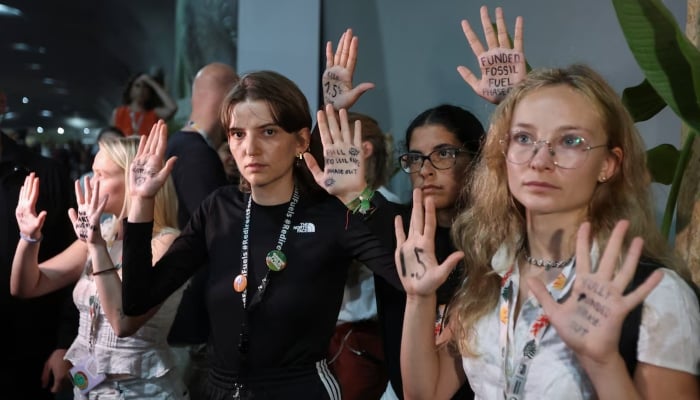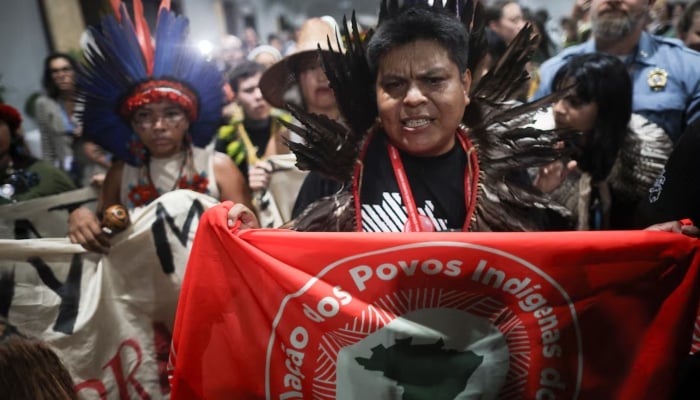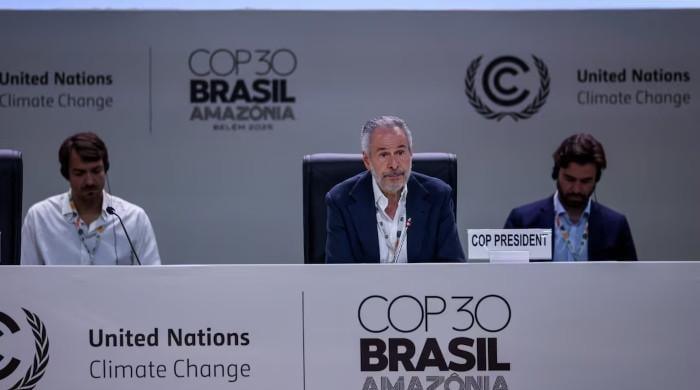- The draft COP30 agreement omits plans for transition to fossil fuels.
- Arab Group says energy industries banned, sources say.
- Developing countries demand a firmer deal on financing.
BELEM: The outcome of COP30 in Brazil remained up in the air, with the European Union refusing to accept a draft agreement that it said would not advance global efforts to reduce greenhouse gas emissions that drive climate change.
The two-week conference being held in the Amazonian town of Belem was scheduled to end Friday evening, but missed that deadline as negotiations continued late into the night.
Brazil billed the summit as a watershed moment for global climate cooperation, urging nations to bridge divisions on issues such as the future of fossil fuels and send the message that concerted global action is the best way forward.
“This cannot be an agenda that divides us,” COP30 President Andre Correa do Lago told delegates in a public plenary session before leaving them for further negotiations.
“We must reach an agreement among ourselves.”
Some emerging economies have hit back at the EU’s position, demanding that the bloc commit more funding to help poorer countries deal with climate change.
“We can’t just work on one path. If there is a path for fossil fuels, there has to be a path for climate finance as well,” said a negotiator from a developing country, granted anonymity to discuss the closed-door negotiations.
Divergences over fossil fuels, faster reductions in CO2 emissions and financing highlighted the difficulty of reaching consensus at the annual conference, an ongoing test of global resolve to avoid the worst impacts of global warming.
A draft agreement text, released by Brazil before dawn on Friday, contained no reference to fossil fuels, abandoning a series of options on the subject that had been included in an earlier version.
Many countries, including major oil and gas producing countries, had opposed these options.
Earlier at the summit, some 80 governments demanded that COP30 present a plan to move away from fossil fuels. But by Friday evening, many of those countries had indicated in closed-door negotiations that they would accept the deal without it, negotiators said.
The burning of fossil fuels emits greenhouse gases which are by far the largest contributors to global warming.
Deadlock on fossil fuels
The EU of 27 considered the text too weak.

“We will under no circumstances accept this,” EU climate commissioner Wopke Hoekstra said in a statement on Friday.
The EU said it could “go beyond its comfort zone” on funding for developing countries – but only if sections of the text on measures to reduce emissions linked to global warming were strengthened.
On Friday evening, some European negotiators said the bloc was considering the possibility of walking away from negotiations rather than accepting the current deal.
A Brazilian negotiator said Reuters language on fossil fuels was unlikely to be reintroduced and the summit presidency was only pushing for slight adjustments to the existing draft.
Other options discussed by negotiators included a separate parallel agreement on fossil fuels, which countries could sign up to voluntarily but which would not be agreed by consensus as COP agreements must be, negotiators said.
According to three sources, the Arab Group negotiating bloc, whose 22 members include Saudi Arabia and the United Arab Emirates, told a closed-door meeting of negotiators that its energy industries were banned from talks.
Saudi Arabia presented an Arab Group statement to negotiators, warning that targeting its industries would derail negotiations, the sources said.
Saudi Arabia did not respond to a request for comment to the Saudi government communications office.
Multilateralism under pressure
The draft agreement also calls for global efforts to triple the financing available to help countries adapt to climate change by 2030, compared to 2025 levels.

However, he did not specify whether this money would be provided directly by rich countries or through other sources, including development banks or the private sector.
A text of agreement would have to be approved by consensus among the nearly 200 countries present to be adopted.
Correa do Lago said a show of multilateral unity was an important signal to send given the absence of the United States this year. President Donald Trump has called global warming a hoax.
“The world is watching,” Correa do Lago said.




